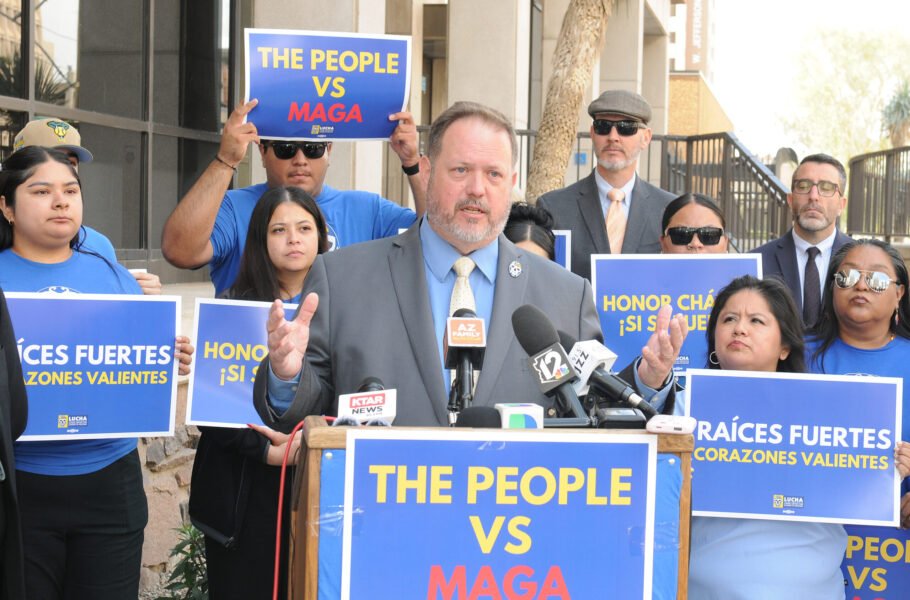border security
Hispanic Rights Group Fights to Block Prop 314 Over Cost Concerns and Discrimination Risks

Opponents of Proposition 314, a voter-approved measure, are taking legal action, claiming it is fundamentally flawed. A Hispanic immigrant rights group has filed a lawsuit in Maricopa County Superior Court, seeking to block the proposition from being implemented.
The legislation permits police to arrest individuals crossing the border outside official ports of entry. Attorney Jim Barton argues this provision improperly defers enforcement to the outcome of a similar law in Texas, which is itself under judicial review. He emphasized that Arizona legislators must independently determine the legality of such measures rather than condition them on developments elsewhere.
Barton also pointed out that Arizona’s Constitution requires any voter-supported measure with financial implications to outline a funding strategy, both immediate and future. Enforcement will incur substantial costs, projected at approximately $60 million for just the first six months. The estimate reflects expenses related to verifying immigration statuses through federal databases.
Furthermore, the attorney indicated the proposition improperly dictates what constitutes “probable cause” for police officers, alleging only courts should hold that authority. Alejandra Gomez, executive director of Living United for Change in Arizona, highlighted that the legal battle extends beyond the law’s specific provisions, framing it as part of a larger systematic attempt to implement a stringent immigration policy in the state.
“This isn’t merely about enforcement. It’s about fear,” Gomez stated during a press conference on April 2. The proposition, passed with 62.5% support in November, is modeled after Texas’ SB4, which is currently on hold pending a federal court’s decision regarding immigration governance.
Previously, Arizona Republicans attempted to advance a similar measure, only for it to be vetoed by Democratic Governor Katie Hobbs. Undeterred, GOP leaders put the matter to voters directly. The ballot initiative encompasses various issues beyond border enforcement, including harsher penalties for using forged documents to obtain public benefits and stricter regulations surrounding proof of legal work eligibility.
The legislation also tightens penalties related to fentanyl sales, enhancing prison sentences for knowing distribution that results in fatalities. Barton argues that the overall measure is unconstitutional due to these various provisions. “The law cannot stand as a whole if integral parts are found unconstitutional,” he asserted.
While Senate President Warren Petersen, a key advocate for the proposal, has not yet responded to the lawsuit, Republican backers anticipated potential legal challenges over funding issues. A legislative budget report indicated significant costs, estimating $41 million for law enforcement and $16.6 million for the incarceration of those arrested in the first six months alone. This figure could soar to $178 million by 2029 if enacted.
Assessing precise costs remains complicated, particularly concerning how long individuals arrested will remain within the justice system. The law allows for first-time offenders to opt for deportation, creating uncertainty about the numbers who would choose this alternative over incarceration.
Additionally, state and local agencies will have to use a federal database to verify eligibility for public benefits, which will increase costs from $1 to $3.10 per inquiry by 2028. Meanwhile, proponents claim the measure could yield substantial fiscal savings, estimating $3.2 billion annually by targeting the unlawful population in Arizona.
Concerns about potential discriminatory enforcement are central to the lawsuit. Critics argue the law’s vague criteria for “probable cause” may lead to biased policing practices, disproportionately impacting Latino communities. Martin Hernandez, one of the plaintiffs, expressed fears within his community, noting existing apprehensions toward law enforcement.
Gomez framed the proposition as part of a broader political agenda that aims to criminalize immigrant families and undermine civil rights. “The agenda is not about safety; it is about control and silencing voices that contribute to Arizona’s diversity,” she stated.
Barton noted that while these legal challenges are not unprecedented, courts generally refrain from engaging with constitutional matters until legislation passes. As of now, no hearing date has been scheduled.


















